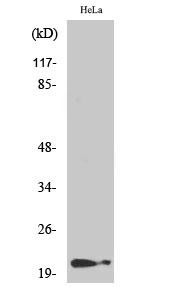p21 (phospho Thr145) Polyclonal Antibody
- Catalog No.:YP0200
- Applications:WB;IHC;IF;ELISA
- Reactivity:Human;Mouse;Rat
- Target:
- p21
- Fields:
- >>Endocrine resistance;>>Platinum drug resistance;>>ErbB signaling pathway;>>HIF-1 signaling pathway;>>FoxO signaling pathway;>>Cell cycle;>>p53 signaling pathway;>>PI3K-Akt signaling pathway;>>Cellular senescence;>>JAK-STAT signaling pathway;>>Oxytocin signaling pathway;>>Parathyroid hormone synthesis, secretion and action;>>Cushing syndrome;>>Hepatitis C;>>Hepatitis B;>>Human cytomegalovirus infection;>>Human papillomavirus infection;>>Human T-cell leukemia virus 1 infection;>>Kaposi sarcoma-associated herpesvirus infection;>>Epstein-Barr virus infection;>>Pathways in cancer;>>Transcriptional misregulation in cancer;>>Viral carcinogenesis;>>Proteoglycans in cancer;>>MicroRNAs in cancer;>>Colorectal cancer;>>Renal cell carcinoma;>>Pancreatic cancer;>>Endometrial cancer;>>Glioma;>>Prostate cancer;>>Thyroid cancer;>>Basal cell carcinoma;>>Melanoma;>>Bladder cancer;>>Chronic myeloid leukemia;>>Small cell lung cancer;>>Non-small cell lung cancer;>>Breast cancer;>>Hepatocellular carcinoma;
- Gene Name:
- CDKN1A
- Protein Name:
- Cyclin-dependent kinase inhibitor 1
- Human Gene Id:
- 1026
- Human Swiss Prot No:
- P38936
- Mouse Gene Id:
- 12575
- Mouse Swiss Prot No:
- P39689
- Immunogen:
- The antiserum was produced against synthesized peptide derived from human p21 Cip1 around the phosphorylation site of Thr145. AA range:111-160
- Specificity:
- Phospho-p21 (T145) Polyclonal Antibody detects endogenous levels of p21 protein only when phosphorylated at T145.
- Formulation:
- Liquid in PBS containing 50% glycerol, 0.5% BSA and 0.02% sodium azide.
- Source:
- Polyclonal, Rabbit,IgG
- Dilution:
- WB 1:500 - 1:2000. IHC 1:100 - 1:300. ELISA: 1:10000.. IF 1:50-200
- Purification:
- The antibody was affinity-purified from rabbit antiserum by affinity-chromatography using epitope-specific immunogen.
- Concentration:
- 1 mg/ml
- Storage Stability:
- -15°C to -25°C/1 year(Do not lower than -25°C)
- Other Name:
- CDKN1A;CAP20;CDKN1;CIP1;MDA6;PIC1;SDI1;WAF1;Cyclin-dependent kinase inhibitor 1;CDK-interacting protein 1;Melanoma differentiation-associated protein 6;MDA-6;p21;
- Molecular Weight(Da):
- 18kD
- Background:
- This gene encodes a potent cyclin-dependent kinase inhibitor. The encoded protein binds to and inhibits the activity of cyclin-cyclin-dependent kinase2 or -cyclin-dependent kinase4 complexes, and thus functions as a regulator of cell cycle progression at G1. The expression of this gene is tightly controlled by the tumor suppressor protein p53, through which this protein mediates the p53-dependent cell cycle G1 phase arrest in response to a variety of stress stimuli. This protein can interact with proliferating cell nuclear antigen, a DNA polymerase accessory factor, and plays a regulatory role in S phase DNA replication and DNA damage repair. This protein was reported to be specifically cleaved by CASP3-like caspases, which thus leads to a dramatic activation of cyclin-dependent kinase2, and may be instrumental in the execution of apoptosis following caspase activation. Mice that lac
- Function:
- function:May be the important intermediate by which p53 mediates its role as an inhibitor of cellular proliferation in response to DNA damage. Binds to and inhibits cyclin-dependent kinase activity, preventing phosphorylation of critical cyclin-dependent kinase substrates and blocking cell cycle progression.,induction:By p53, mezerein (antileukemic compound) and interferon beta.,PTM:Phosphorylation of Thr-145 by Akt or of Ser-146 by PKC impairs binding to PCNA.,similarity:Belongs to the CDI family.,tissue specificity:Expressed in all adult human tissues, with 5-fold lower levels observed in the brain.,
- Subcellular Location:
- Cytoplasm . Nucleus .
- Expression:
- Expressed in all adult tissues, with 5-fold lower levels observed in the brain.
Synergetic and Antagonistic Molecular Effects Mediated by the Feedback Loop of p53 and JNK between Saikosaponin D and SP600125 on Lung Cancer A549 Cells. MOLECULAR PHARMACEUTICS Mol Pharmaceut. 2018;15(11):4974–4984 WB Human 1:1000 A549 cell
Hey1 promotes migration and invasion of melanoma cells via GRB2/PI3K/AKT signaling cascade. Journal of Cancer J Cancer. 2021; 12(23): 6979–6988 WB Human 1:1000 A375 cell
- June 19-2018
- WESTERN IMMUNOBLOTTING PROTOCOL
- June 19-2018
- IMMUNOHISTOCHEMISTRY-PARAFFIN PROTOCOL
- June 19-2018
- IMMUNOFLUORESCENCE PROTOCOL
- September 08-2020
- FLOW-CYTOMEYRT-PROTOCOL
- May 20-2022
- Cell-Based ELISA│解您多样本WB检测之困扰
- July 13-2018
- CELL-BASED-ELISA-PROTOCOL-FOR-ACETYL-PROTEIN
- July 13-2018
- CELL-BASED-ELISA-PROTOCOL-FOR-PHOSPHO-PROTEIN
- July 13-2018
- Antibody-FAQs
- Products Images

- Western Blot analysis of various cells using Phospho-p21 (T145) Polyclonal Antibody

- Immunohistochemistry analysis of paraffin-embedded human breast carcinoma, using p21 Cip1 (Phospho-Thr145) Antibody. The picture on the right is blocked with the phospho peptide.

- Western blot analysis of lysates from HeLa cells treated with EGF, using p21 Cip1 (Phospho-Thr145) Antibody. The lane on the left is blocked with the phospho peptide.



